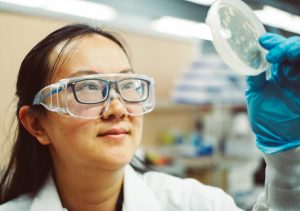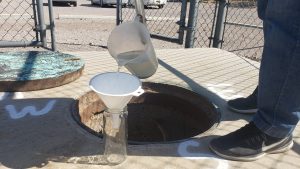By Tiffany Acosta, 575-646-3929, tfrank@nmsu.edu
Date 08/31/2020
 |
||
|
|
|
As a member of an interdisciplinary team testing wastewater samples for SARS-CoV-2, Civil Engineering Assistant Professor Yanyan Zhang is responsible for developing the pretreatment method to concentrate the SARS-CoV-2 in wastewater. (NMSU photo by Vladimir Avina) |
A team of researchers at New Mexico State University is developing protocols to test wastewater samples as a possible method for early detection of SARS CoV-2, the virus that causes COVID-19. The team is an interdisciplinary effort from the colleges of Engineering, Arts and Sciences, and Agricultural, Consumer and Environmental Sciences.
The research team is working with NMSU Facilities and Services officials to determine sampling locations, timing and frequency on the Las Cruces campus and Doña Ana Community College and to obtain samples. Once in the laboratory, researchers have to concentrate the sample and then analyze for detection of SARS CoV-2 and quantify the abundance.
“Wastewater testing at select campus locations will be an early COVID warning system that, along with other tools in the toolkit, such as COVID-19 PCR-test screening, symptom monitoring, self-check reporting and contact tracing, will provide evidence NMSU leadership uses to respond to changing conditions,” said Luis Cifuentes, vice president for research and dean of the Graduate School.
Biology Professor Jiannong Xu, who is coordinator of the wastewater surveillance team, conducts wastewater sampling, concentration and RNA extraction in his lab. The RNA samples are then sent to Associate Professor Willis Fedio’s Food Safety Lab for SARS-CoV-2 detection. Fedio is using a real-time PCR machine to test the samples. Wastewater analysis has been used across the country, and Fedio has contacted faculty members at other universities about their experiences with wastewater testing.
“The wastewater surveillance is to monitor dynamics of SARS CoV-2 virus at the level,” Xu said. “Representative sampling is critical. It is challenging to do so. We are in the early stage to figure out sampling times and wastewater amount that are appropriate to get informative data.”
 |
| NMSU Biology Professor Jiannong Xu is conducting wastewater sampling, concentration and RNA extraction as part of an interdisciplinary team focused on COVID-19 early detection. (NMSU photo) |
Civil Engineering Assistant Professor Yanyan Zhang is responsible for developing the pretreatment method to concentrate the SARS-CoV-2 in wastewater.
“Due to the low concentration of SARS-CoV-2 in the sewage, we need to perform the concentration step before RNA extraction and RT-qPCR detection,” she said. “That’s why we have modified the surface charges of the viruses in wastewater to let them have positive charges. Next, we pass the water with positively charged viruses through a negatively charged membrane filter to let viruses adsorb on the membrane. Then, the membrane filters with concentrated viruses can be used for RNA extraction.
“I feel the most challenging part of the projects is how to develop the sampling strategy to get representative wastewater samples,” Zhang said. “Luckily, we have gotten help from Patrick Chavez, director of Utilities and Plant Operations at NMSU, and Terry Mount, department head of DACC’s Commercial Technologies Department, to identify some sampling locations to target potential hot spots in the campus and the ability to properly acquire samples.”
 |
| NMSU researchers extract wastewater samples for testing as a possible early detection method of SARS CoV-2, the virus that causes COVID-19. (NMSU photo by Jiannong Xu) |
